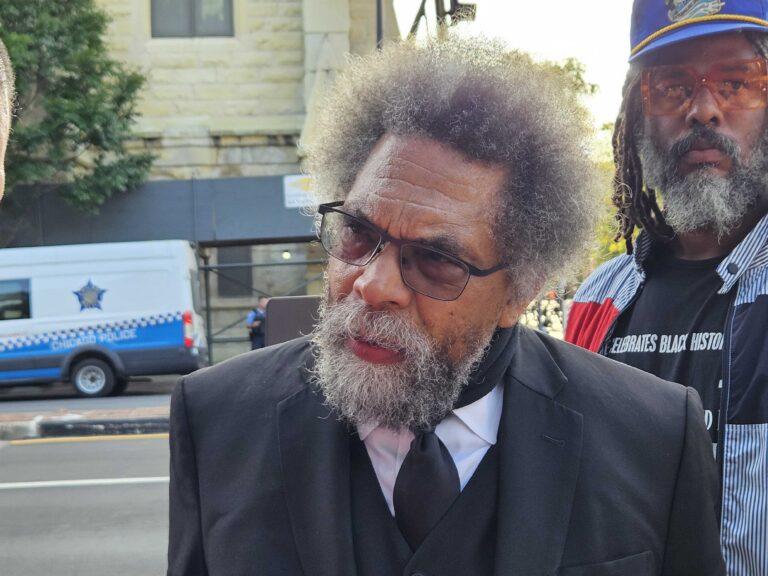
Caption
Independent candidate Cornel West appeared at a protest outside the 2024 Democratic National Convention in Chicago.
Credit: Ross Williams/Georgia Recorder

Independent candidate Cornel West appeared at a protest outside the 2024 Democratic National Convention in Chicago.
The Georgia Supreme Court has ruled against bids by two independent presidential candidates to count on ballots for the state’s November election.
Independent presidential candidate Cornel West and Party for Socialism and Liberation candidate Claudia De la Cruz are not qualified to run for president in Georgia, the court ruled unanimously Wednesday, marking a win for Democrats, who sought to keep the left-wing candidates off the ballot.
A lawyer for Secretary of State Brad Raffensperger told justices during arguments Tuesday that it was too late to change ballots, but if the court ruled against the candidates, Raffensperger’s office would place notices at polling places and within absentee ballot envelopes that votes for either candidate will not be counted. With this decision, Georgians will choose between Republican Donald Trump, Democrat Kamala Harris, Libertarian Chase Oliver and Green Party candidate Jill Stein on Nov. 5.
De la Cruz said her campaign is “weighing its future legal options” and called the arguments in favor of the decision “outlandish,” arguing that if independent candidates were to follow the rules as proscribed by the justices, they would have to collect more than 120,000 signatures to qualify for Georgia ballots, an overburdensome number.

Claudia De la Cruz, left, and Karina Garcia are running for President and Vice-President as the candidates of the Party for Socialism and Liberation.
“Democratic Party lawyers and the Republican-majority Supreme Court worked together to suppress democracy,” she said in a statement. “This unjust ruling is a reminder of why it is so urgent to build an alternative outside the two-party system. We have a socialist program that speaks to the needs of working people — clearly this is something that scares the Democrats and Republicans, and the Wall Street billionaires who control both parties. Regardless of this ruling, we will not stop organizing in this state and we will continue to spread our socialist message far and wide.”
In an email, a spokesman for West said the campaign continues to encourage supporters to vote for West.
The justices’ decision had to do with the meaning of the word “candidate” in part of state code.
When Americans vote for a presidential ticket, they are not actually voting for the presidential and vice presidential candidates directly. Instead they are voting for a slate of presidential electors, who will vote for the candidate in the Electoral College, a group of 538 people from across every state based on population. Georgia’s 16 electoral votes are supposed to all go to the candidate who wins the majority of the votes in the state, and the winning candidate will need 270 total electoral votes to win the White House.
Under Georgia law, candidates — to become electors, not to become president — have to file under their own names petitions to have their independent candidates — to become president — placed on the ballot. De la Cruz and West’s elector candidates filed petitions under the presidential candidates’ names instead.
According to the state Supreme Court, presidential electors have been described as “candidates” in state code since at least 2005.
The high court’s ruling affirms the decisions of a state administrative law judge and two Fulton County Superior Court judges, but reverses a ruling from Raffensperger, a Republican and the state’s top election official.
Raffensperger and other state Republicans made strange bedfellows with West and De la Cruz, who are both to Harris’ left. With the 2024 election likely to be close, some argued that the two progressives could have siphoned off some voters who may have otherwise preferred Harris.
In a Thursday email, Raffensperger’s office reaffirmed it will respect the Supreme Court’s decision and, citing statements from the justices, suggested that lawmakers may wish to clarify state code dealing with independent presidential candidates.
This story comes to GPB through a reporting partnership with Georgia Recorder.